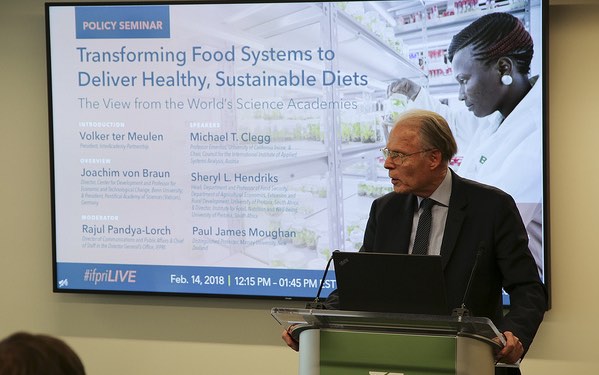A new report from the InterAcademy Partnership (IAP)—a global network of of about 130 Academies of Science, the communities of leading scientists, medical and engineering experts—explores the challenges and opportunities for science in transforming food systems in around the world. At a Feb. 14 IFPRI policy seminar, IAP members discussed the report’s implications for food security in the Americas, Africa, and Asia.
The IAP’s main goal, according to its President Volker ter Meulen, is to “provide science advice to policy makers and to society … and collectively advance sound policies to help achieve critical development goals.” The report focuses on the critical role that science, technology and innovation (STI) must play in shaping food policies and programs, particularly in developing countries.
A food systems approach to delivering health and well-being must start with a proper definition of the concepts involved, said former IFPRI Director General Joachim von Braun, now director of the Center for Development at the University of Bonn. “It’s not good enough to argue that healthy diets have lots of fruits and vegetables and a little bit of animal-based products,” von Braun said. A better understanding of the economics and biology of nutrition, including the ways the body processes nutrients, is critically important, he said.
The global report makes three broad recommendations, von Braun said: Organizations should support and share basic and applied research for improved food, nutrition, and agriculture; translate research to innovation to achieve impact; and upgrade scientific infrastructure.
Presenting on the Asian report, Paul James Moughan, distinguished professor at Massey University in New Zealand, argued that STI must play a leading role if progress is to be made building food security. Asia’s high-risk countries should employ a systems analysis approach for developing a blueprint for food and agricultural research and extension.
“Science offers solutions, but plans need to be made now and enacted boldly and decisively if catastrophe and great suffering are to be avoided” and food and nutrition security achieved, he said.
Summarizing the Africa report, Sheryl L. Hendriks, head of the Department of Agricultural Economics, Extension and Rural Development at the University of Pretoria, South Africa, explained that the continent’s food system transformation, still in its early stages, remains fragile. Technology can extend shelf life and make foods easier to prepare, but in rural areas, food systems will require more energy, she said, so there are tradeoffs. Ongoing changes could have negative impacts on public health, unless steps are taken to protect it.
She outlined the report’s six priority areas: Strong political commitment informed by scientific evidence; agriculture and food system efficiency; resilient farming systems; efficient food systems that pay attention to human well-being and health; food safety and waste reduction; and human capacity. STI offer promising opportunities for overcoming challenges and achieving Agenda 2063 (the African Union’s strategic framework for transforming the continent over 50 years), Hendriks said, while simultaneously protecting the heritage of its nutritious food sources and ensuring sustainable and diverse diets.
Within the Americas, the Caribbean region is particularly vulnerable to food insecurity, said Michael T. Clegg, Professor Emeritus at the University of California, Irvine. It imports over 60 percent of its food supply, has a declining arable land inventory and high population density, and also faces climate change impacts including rising sea levels and extreme weather events.
Overall, however, the Americas are a privileged region, Clegg said, thanks to agrobiodiversity wealth, the abundance of arable land, and availability of water. Good governance and public policy are still critical, he said, if the hemisphere is to achieve food and nutrition security and develop sustainable agricultural policies.
Though not addressed at the event, a Europe report is also available. It notes prevalent public health issues due to overconsumption of processed, calorie-dense foods and the need for the region to acknowledge the gravity and scope of this problem, and the great potential of European research and innovation in improving global food security.
Katarlah Taylor is an IFPRI Senior Events Specialist.







